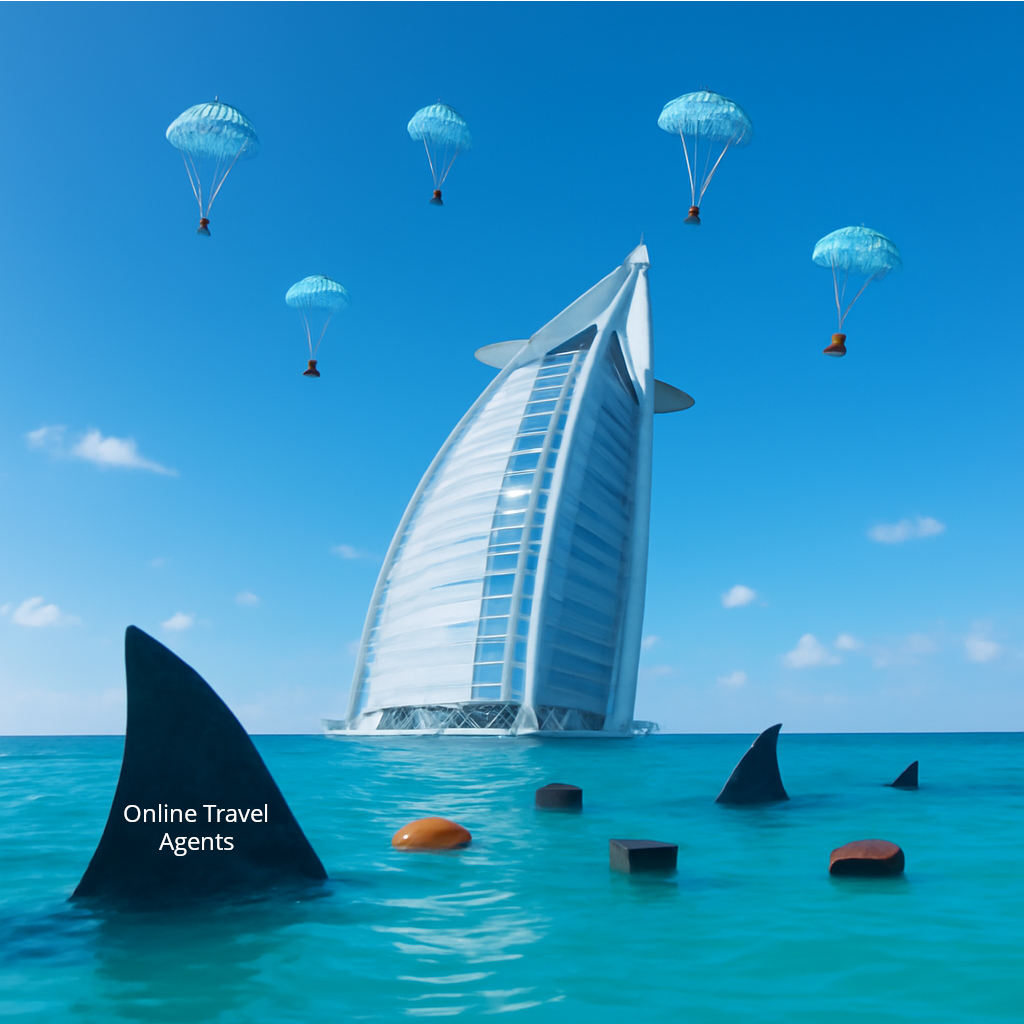Three reasons why independent hotels and luxury resorts can smile when looking to the future
Many Digital Marketing agencies throw themselves on to the idea that they can beat the OTAs with their direct book strategies. This is quite impossible (for now). You don’t suddenly overturn a revenue making machine that has been running for more than 20+ years. However, what hotels can do and what we do with success is divert revenues back to the hotel at a lower cost, while at the same time building the hotels’ brand and digital presence.
In this post we use our experience to crystal ball gaze to the future, and elaborate where we see the big opportunities for Independent hotels and luxury resorts as digital moves to version 3.0.
What’s going to happen to the revenue channel mix? What does hospitality need to do to make itself ready to attract Generation Z bookers? And will we see the death of OTAs in the next five or ten years?
1. FURTHER CHANNEL DIVERSIFICATION AND FRACTURING ONLINE LEADING TO MORE DIRECT BOOKING OWNERSHIP
Coming through COVID what was really clear was just how fragile the OTAs business models were. Booking.com asking for a bailout is something no one could imagine happening but it did. There was both an industry feeling and a narrative played out that OTAs were failing at customer service going through COVID.
Even prior to COVID fresher market operators such as Airbnb had placed more pressure on the established OTA set and forced them to broaden the scope of their accommodation offering (remember Amoma’s end in 2019?) – away from hotels into apartment rentals. The knock on was higher operating costs due to having clients that were no longer experienced hospitality businesses (hotel) but mom and pops outfits with lots of questions!
During COVID we also saw Google massively ramp up its Google Hotel Ads offering - IE the box of rates that appear on the homepage of Google when typing in the hotel’s name. This took the form of:
a) giving more prominence to these types of hotel listings (for which they earn for every click, or even on a commission model like the OTAs do) and;
b) giving hotel’s completely free traffic from these listings which directly challenged the ability for OTAs to compete and own the advertising space (as they had done historically).
New disruptive operators are also starting to take aim on the OTA revenues too. These include UBER, and price tracker apps like HOPPA. These will further diversify the channel mix. Amazon and Apple still need to get on-board, but there is no immediate hurry for them to do this, however it seems logical that they will create their own closed advertising network like Facebook (currently trying to capture Gen Z but failing as TikTok takes over). It seems probable that Elon Musk will attempt to make Twitter more in line with other social networks to own a piece of the pie too.
If you go back 20 years, the OTAs did not have these challenges as travel distribution was exclusively in their hands, and they had the technological edge to outflank hotels. This is no longer the case. Many of these ad-tech advantages are in the hands of digital marketing agencies such as ours. It’s also going to get worse for OTAs in the future. A sign of this difficulty is how much OTAs have, since exiting COVID, invested in their own loyalty clubs – we wrote about why they did that that here.
OTAs, citing an increase in mobile bookings as a change in habits after COVID, seem to be doing nothing more than trying to get a unique rate from the hotel (in return for extra commission or better rates) to allow them to distinguish themselves from other OTAs and hotels in a landscape where price parity (excluding those annoying wholesalers!) now makes their standard price offering unappealing.
All the above means that the OTA as a revenue channel is going to come under more pressure in the coming years and this will give a hotel’s Revenue Management teams more leverage in setting commissions and rates they are prepared to concede to them.
2. MILLENNIALS VS GENERATION Z: MORE PERSONALIZED LOCAL EXPERIENCES THAT FAVOUR THE INDEPENDENT HOTEL & LUXURY DESTINATION
The focus on hotels’ marketing today is on Millennials and to a lesser extent Boomers (Boomers II). What is changing with the next generation of travellers are the Generation Z habits (also now filtering back up to younger family Millennials) - the importance of a local experience, a cultural experience, something that isn’t packaged up and that feels personal is paramount. These are all things that OTAs and chains have a great problem scaling, something that an Independent hotel or luxury resort does not. In fact, it’s actually something they do effortlessly.
As an example of how badly OTAs adapt to changes, take how they fared in Thailand during COVID when suddenly there were lots of personal details needed prior to guest arrival in the country. Throughout this period, hotels in Bangkok that were able to follow the government’s COVID requirements saw good direct revenues because they were able to adapt quickly and make these changes - we helped our Clients with bespoke sales funnels and Google Ads campaigns going live in a few days to capture these bookings.
By contrast the inability of OTAs to personalise the booking and checkout experience – in this case something as simple as adding COVID policies and a lead-form to capture requests – really speaks volumes about how delicate their single session booking and checkout experience is.
We do see OTAs featuring strongly as revenue partners, but over the longer term feel that they will fill a very standard type of booker.
What Generation Z’s want is a personalized experience and this can be much more easily handled by the hotel, signed off and underwritten by their hospitality experience. It’s simply an extension of this.
We think this will mean that if hotels are able to create packages that respond to the needs of the audiences, by bundling experiences or choices of experiences that really resonate with the different audience segments, the ability for the hotel, instead of an OTA, to close bookings will be significant.
The ‘click to book’ segments may find an OTA easily, but specific segments – for example families, couples and niche high value segments (FIT/Transient/group) – can book a package on the hotel booking engine that gives them the room at an amazing price, something value added (breakfast included is standard now), packaged dining offers, and local experiences. This is where we see the opportunity for luxury hotels allowing them to win higher value bookings.
3. CUSTOMER ACQUISITION CHALLENGES PRESENT EVEN MORE OPPORTUNITIES TO STEAL MORE BUSINESS FROM OTAS.
At the time of writing, Facebook has lost 43% of its share value to date. This seems largely due to changes in browser settings, privacy changes made by Apple and made worse by its advertiser user base that after being treated badly by Facebook for so long, are not crying over their woes - instead they are now investing in other advertising channels. These changes also affected Google but have been less impactful (however their haste to roll out GA4 is no doubt triggered by the impending cookie-less browsing threat to their advertising model).
OTAs have seen one of their most historic method of customer acquisition devastated by factors outside their control - technology giants fighting it out between themselves for ownership of revenue channels. Facebook took a hit from Apple because Apple wanted to protect its users (privacy update), even if it has been suggested that this is more likely about ownership of revenue for Apple than anything else.
We wrote previously about the impact of these changes on OTA advertising models and when we look at these changes alongside the priority Google is able to give easily to its own products – products hotels using Internet Affected’s services make it possible to compete directly using the mechanisms from the OTA tech-stack we are stealing the revenue away from the OTAs and dropping those revenues directly into the hotel’s bank account at about a quarter of the cost.
What we see with our own Client set is that by understanding the hotel needs and investing in the right areas, they have exited COVID with their direct business skyrocketing.
Revenue is a healthy measurement but that is really controlled at the revenue management level. Where we see seismic shifts is both in terms of transaction volume and the visit to book conversion rates of the magnitude 100%+ when compared to 2019.
Our Clients didn’t just build extra rooms so that increase in transaction volume is being stolen from OTAs.
It’s unrealistic for hotels to expect to compete with OTAs, OTAs have more advertising spend and digital reach. so direct bookings will be a fraction of that – in the short-term.
But if a hotel buys its brand name it’s Google Ad will always cost less than any OTA that competes with it. That is because Google wants to cut out the middleman (OTAs) and be the new middleman, and that means that if your hotel has the best rate, that booking can be yours.
The hotel gains from this strategy by having less dependency on OTA channels, which can arbitrarily be affected by any number of commercial/societal frictions - while increasing its own brand and visibility across the digital universe. It also gains more leverage over the OTAs in the process.
Hotels can compete directly with OTAs in the main digital channels and win revenue at a much lower cost than paying the escalating OTA commissions. Google, as do all major advertising networks, wants to cut out the middleman long term. That means OTAs. Hotels can therefore find good opportunities to investing in direct advertising and taking advantage of these benefits.
For example, currently there are significant benefits to a hotel owning its own Google Ads outright than having this managed and owned by a third-party agency.
There are many more opportunities that we explore for our Clients.
CONCLUSION
Taking a zoomed out view we see a huge opportunity for Independent hotels and Luxury Resorts to distinguish themselves in a marketplace that seems to be normalizing the hospitality experience. Luxury as a design statement is becoming more two-dimensional, manufactured and common, like a photographic filter.
Independent hotels that can be free from OTA/Packaged Branding restraints can attract the next generation, and will be better positioned to leverage their unique voice and make a bigger appeal for their booking. We work with these properties, those that have recently launched, to established Independent hotels that have gone through $100M+ refurbishments. We support their marketing goals helping them create their unique voice in a crowded marketplace.
Internet Affected provides luxury hospitality brands with unique, tried and tested marketing strategies that provide visibility covering search, social and emerging technology formats. Our focus is on increasing revenue in the direct channel and in helping the hotel discover completely new guests to grow year on year sales volume.
It’s a great time for hotels if you pick the right agency as your partner. Reach out and let us help your hotel take advantage of the future.
About the Author
Glyn Spencer Hopkins is the owner of Internet Affected and has been working exclusively with hotels for over a decade.
Internet Affected provides web marketing services tailored to the individual personalities of hotels; a complete range of digital services designed to help them take back ownership of their hotel brand from the OTAs. Specialized marketing solutions to increase guest loyalty, food & beverage bookings, events and wedding inquiries, clearly reported in straightforward language.











